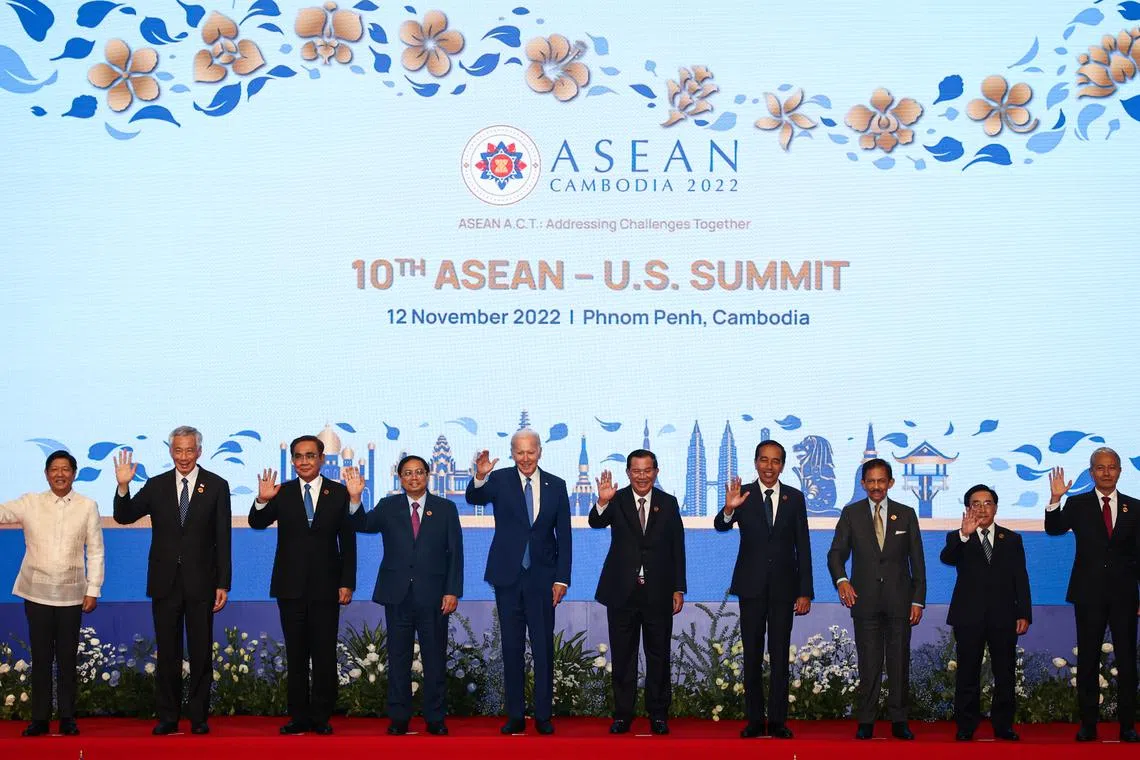Asean upgrades ties with India, United States
Sign up now: Get insights on Asia's fast-moving developments

Asean leaders, including Singapore's PM Lee Hsien Loong (second from left), posing with US President Joe Biden at the Asean-US Summit.
PHOTO: LIANHE ZAOBAO
PHNOM PENH - Asean has formally upgraded its ties with India and the United States to comprehensive strategic partnerships, a move the grouping hopes will boost trade and investment flows and collaboration with two of its largest partners. The upgrades on Saturday come a year after Asean set up its first two such partnerships with Australia and China, which Asean leaders meeting their counterparts in Cambodia’s capital this weekend also took stock of.
At the core of these partnerships is mutual support for an open, transparent, inclusive and rules-based architecture with Asean at the centre of developments in the region.
US President Joe Biden told Asean leaders at the Asean-US Summit that the agreement would help build “an Indo-Pacific that’s free and open,
Prime Minister Lee Hsien Loong told the summit that Asean-US relations have achieved a new milestone, and that the grouping appreciates America’s continued focus on Asean amid its many preoccupations in other parts of the world. “Asean has greatly benefited from US’ presence in the region. At the same time, Asean believes that we can be a useful partner to the US,” he said.
The partnership, PM Lee added, was a basis for both sides to deepen collaboration in areas like clean energy research and deployment, where there are many opportunities for US companies in the region. These include low-carbon energy solutions and green energy infrastructure, renewable energy deployment and power grids, he said. Singapore and the US are working on a feasibility study on enhancing regional networks to strengthen energy security and grid resilience.
PM Lee, however, cautioned that the region’s progress depends on a stable global geopolitical climate, and Russia’s invasion of Ukraine has caused upheaval, destruction and human misery. Singapore strongly condemns the invasion, he said, adding that the Republic cannot accept any violation of a country’s sovereignty, political independence and territorial integrity. “Asean shares the US’ desire for a swift and peaceful solution to the conflict,” he said.
Turning to the US-China relationship,
PM Lee also touched on the South China Sea, reiterating that the waterway is a key channel for global trade, and thus of concern to not just claimants but the international community. Asean welcomes a code of conduct that is in accordance with international law, including the 1982 United Nations Convention on the Law of the Sea, and that safeguards the rights and interests of all parties, he said.
The White House said on Saturday that the US has provided more than US$860 million (S$1.18 billion) in assistance to its Asean partners in 2022, in support of climate ambition and the clean energy transition, access to education, strengthened health systems, security modernisation efforts and other areas. Mr Biden said he has requested US$825 million in assistance for South-east Asia for 2023.
At the Asean-India Summit attended by Indian Vice-President Jagdeep Dhankhar, PM Lee noted that the grouping is marking the 30th anniversary of dialogue relations with India, making the upgrade of their ties a timely one.
Singapore is the current country coordinator for Asean-India ties, and PM Lee said Asean valued India’s support for Asean centrality and Asean-led mechanisms in the evolving regional architecture. He suggested that both sides can explore practical cooperation between the Asean Outlook on the Indo-Pacific and India’s Indo-Pacific Oceans Initiative. Asean and India should also facilitate stronger trade and investment flows, and Asean welcomed the endorsement of a paper to review the Asean-India Trade in Goods Agreement and looked forward to the review’s early conclusion, he said.
Asean also welcomed India’s contributions to regional connectivity, and encouraged India to continue supporting the Master Plan on Asean Connectivity 2025. The initiative aims to build a better-connected region through improvements in infrastructure, digital innovation and logistics, among others. Asean also looked forward to the completion of the India-Myanmar-Thailand Trilateral Highway and its possible extension to Laos, Cambodia and Vietnam, PM Lee added.
Asean and India should also collaborate in new areas such as digitalisation and cyber security, public health infrastructure, and vaccine production and distribution, said PM Lee, citing existing resources such as the Asean Smart Cities Network and Asean-Singapore Cybersecurity Centre of Excellence.
On Saturday, PM Lee and other Asean leaders held separate summits with Australian Prime Minister Anthony Albanese, Japanese Prime Minister Fumio Kishida and Canadian Prime Minister Justin Trudeau. The Asean leaders also attended the Asean Plus Three Summit with their counterparts from China, Japan and South Korea, where PM Lee called for strengthening supply chain connectivity and building resilience against economic and financial shocks, as well as future public health threats.
PM Lee also met Vietnamese Prime Minister Pham Minh Chinh, and they welcomed further cooperation in the green and digital economies.
PM Lee also met UN Secretary-General Antonio Guterres, and they had a wide-ranging discussion on international issues, including major power contestation, the climate crisis, and the war in Ukraine. PM Lee reiterated Singapore’s support for the UN, in particular the Our Common Agenda initiative to revitalise the global body, and both sides reiterated their commitment to work together to strengthen the inclusive and rules-based multilateral system.



